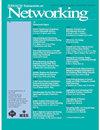Federated PCA on Grassmann Manifold for IoT Anomaly Detection
IF 3.6
3区 计算机科学
Q2 COMPUTER SCIENCE, HARDWARE & ARCHITECTURE
引用次数: 0
Abstract
With the proliferation of the Internet of Things (IoT) and the rising interconnectedness of devices, network security faces significant challenges, especially from anomalous activities. While traditional machine learning-based intrusion detection systems (ML-IDS) effectively employ supervised learning methods, they possess limitations such as the requirement for labeled data and challenges with high dimensionality. Recent unsupervised ML-IDS approaches such as AutoEncoders and Generative Adversarial Networks (GAN) offer alternative solutions but pose challenges in deployment onto resource-constrained IoT devices and in interpretability. To address these concerns, this paper proposes a novel federated unsupervised anomaly detection framework – FedPCA – that leverages Principal Component Analysis (PCA) and the Alternating Directions Method Multipliers (ADMM) to learn common representations of distributed non-i.i.d. datasets. Building on the FedPCA framework, we propose two algorithms, FedPE in Euclidean space and FedPG on Grassmann manifolds. Our approach enables real-time threat detection and mitigation at the device level, enhancing network resilience while ensuring privacy. Moreover, the proposed algorithms are accompanied by theoretical convergence rates even under a sub-sampling scheme, a novel result. Experimental results on the UNSW-NB15 and TON-IoT datasets show that our proposed methods offer performance in anomaly detection comparable to non-linear baselines, while providing significant improvements in communication and memory efficiency, underscoring their potential for securing IoT networks.用于物联网异常检测的格拉斯曼漫域上的联合 PCA
随着物联网(IoT)的普及和设备互联程度的不断提高,网络安全面临着巨大的挑战,尤其是来自异常活动的挑战。虽然传统的基于机器学习的入侵检测系统(ML-IDS)有效地采用了监督学习方法,但它们也存在一些局限性,例如对标记数据的要求和高维度的挑战。自动编码器和生成对抗网络(GAN)等最新的无监督 ML-IDS 方法提供了替代解决方案,但在部署到资源受限的物联网设备和可解释性方面存在挑战。为了解决这些问题,本文提出了一种新颖的联合无监督异常检测框架--FedPCA,它利用主成分分析(PCA)和交替方向法乘法器(ADMM)来学习分布式非 i.i.d. 数据集的通用表示。在 FedPCA 框架的基础上,我们提出了两种算法:欧几里得空间中的 FedPE 和格拉斯曼流形上的 FedPG。我们的方法可在设备层面实现实时威胁检测和缓解,在确保隐私的同时增强网络弹性。此外,即使在子采样方案下,所提出的算法也具有理论收敛率,这是一项新成果。在 UNSW-NB15 和 TON-IoT 数据集上的实验结果表明,我们提出的方法在异常检测方面的性能可与非线性基线相媲美,同时在通信和内存效率方面也有显著提高,这凸显了它们在确保物联网网络安全方面的潜力。
本文章由计算机程序翻译,如有差异,请以英文原文为准。
求助全文
约1分钟内获得全文
求助全文
来源期刊

IEEE/ACM Transactions on Networking
工程技术-电信学
CiteScore
8.20
自引率
5.40%
发文量
246
审稿时长
4-8 weeks
期刊介绍:
The IEEE/ACM Transactions on Networking’s high-level objective is to publish high-quality, original research results derived from theoretical or experimental exploration of the area of communication/computer networking, covering all sorts of information transport networks over all sorts of physical layer technologies, both wireline (all kinds of guided media: e.g., copper, optical) and wireless (e.g., radio-frequency, acoustic (e.g., underwater), infra-red), or hybrids of these. The journal welcomes applied contributions reporting on novel experiences and experiments with actual systems.
 求助内容:
求助内容: 应助结果提醒方式:
应助结果提醒方式:


